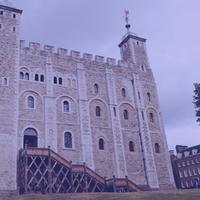Episode 280: The Tower of London [2]
Folge 280: Der Tower von London [2]
Episode 280: The Tower of London [2]
Episodio 280: La Torre de Londres [2]
Épisode 280 : La Tour de Londres [2]
第280話ロンドン塔【2
Odcinek 280: Tower of London [2]
Episódio 280: A Torre de Londres [2]
Эпизод 280: Лондонский Тауэр [2]
280\. Bölüm: Londra Kulesi [2]
Епізод 280: Лондонський Тауер [2].
第280集:伦敦塔[2]
The tradition of keeping ravens at the Tower of London
||||ravens|||||
Kuzgunları Londra Kulesi'nde tutma geleneği
Традиція утримання круків у Лондонському Тауері
dates back to the time of Charles II in the 17th century.
17th century|||||||||||
remonta ao tempo de Carlos II no século XVII.
17\. yüzyılda Charles II zamanına kadar uzanır.
While there had been ravens earlier, Charles II was the first monarch to insist
|||||||||||||наполягати
Embora houvesse corvos antes, Carlos II foi o primeiro monarca a insistir
Хоча круки з'являлися і раніше, Карл II був першим монархом, який наполіг на тому, щоб
that they were protected, appointing a Yeoman Warder Ravenmaster to care for them.
|||||||Yeoman Warder|Raven caretaker||||
||||призначаючи|||вартовий|||||
que eles estavam protegidos, nomeando um Yeoman Warder Ravenmaster para cuidar deles.
щоб вони були під захистом, призначивши старшину-вартового Воронмастера, який би піклувався про них.
Legend has it that there must always be a minimum of six ravens at the
Tower or else the Tower and the monarchy will fall, it will collapse.
|||||||||||future tense marker|
||інакше|||||монархія|||||зруйнується
Torre ou então a Torre e a monarquia cairão, ela cairá.
Вежа, інакше Вежа і монархія впаде, вона зруйнується.
Naturally, it's not a good idea to leave the fate of the Tower of London or the monarchy
of course|||||||||||||||||
Природно|||||||||доля||||||||
Naturalmente, não é uma boa ideia deixar o destino da Torre de Londres ou da monarquia
Звісно, не варто залишати долю Лондонського Тауера чи монархії напризволяще
当然,离开伦敦塔或君主制的命运并不是一个好主意
completely up to the ravens, so their feathers are cut so they can't fly to far.
|||||||пір'я||||||||
completamente|||||||||||||||
completamente até os corvos, então suas penas são cortadas para que eles não possam voar para longe.
повністю залежить від круків, тому їхнє пір'я обрізають, щоб вони не могли далеко відлетіти.
完全由乌鸦决定,所以它们的羽毛被剪掉,这样它们就不能飞太远。
As a little fun linguistic aside, the collective noun for a group of ravens is an unkindness or
|||||uma curiosidade|||||||||||uma maldade|
|||розвага||побічно||колективний||||||ворони|||недоброзичливість|
Como um pouco de diversão linguística à parte, o substantivo coletivo para um grupo de corvos é uma grosseria ou
Як невеличкий лінгвістичний екскурс, збірний іменник для позначення групи круків - це недоброзичливість або недоброзичливість.
a conspiracy - it's probably linked to ravens often being considered to be unlucky or creepy.
|змову||||||||вважається|||нещасливий||жахливий
Now, just to conclude this episode, I wanted to share some other interesting facts about what else
|||завершити||||||||інші|||||
The Tower of London was used for, facts you might not hear on a tour, or read about in a guide book.
From the 1200s to 1835, the Tower of London also housed what was known
|||||||||розміщував|||
З 1200-х до 1835 року в Лондонському Тауері також розміщувалося те, що було відомо як
as the Royal Menagerie, essentially a zoo containing exotic animals.
|||менажерія|по суті|||||
The Tower of London was at one point home to a polar bear, a gift
||||була||||||||ведмідь||подарунок
Лондонський Тауер колись був домом для білого ведмедя, подарованого
from the King of Norway, an elephant, from the King of France and
three lions, or possibly leopards, gifted by the Holy Roman Emperor.
||||||||||Imperador romano
||||леопарди|подаровані|||святий||
три леви, або, можливо, леопарди, подаровані імператором Священної Римської імперії.
Over the years, the collection grew to include a tiger, jackals, leopards and eagles.
||||||||||jackals|||
||||колекція|зросла|||||шакали|||
However, over time people became more aware of the unsuitability of
|||||||||unsuitability|
Однак||||||усвідомленими|||недоречність|
Однак з часом люди стали більше усвідомлювати непридатність
the surrounding for animals, and the Menagerie closed down in 1835.
|оточуюче|||||менажерія|||
What happened to the animals, you might be asking?
Ви можете запитати, що сталося з тваринами?
Well, 150 animals were rehoused to Regent's Park in 1826, creating what would become
|||relocated||Regent's||||||
|||переселені||||||||
London Zoo, an actual, purpose-built real zoo, not a prison-come-castle turned into a zoo.
||||мета||||||в'язниця|і замок|замок|перетворений|||
And although exotic animals are precious and valuable, they weren't the
|||||цінні||цінні|||
І хоча екзотичні тварини дорогоцінні та цінні, вони не були
most valuable things kept under lock and key at The Tower of London.
|цінні речі|||під|замок||ключ|||||
найцінніші речі, що зберігаються під замком у лондонському Тауері.
Weapons and armour were stored there, of course.
As armas||armadura|||||
Зброя||броя||зберігалися|||
Звісно, там зберігалася зброя та обладунки.
But, being such a secure place, the Tower of London was the ideal
||||безпечне||||||||
place to control England's currency supply, the supply of money.
||||moeda|||oferta||
||||валюти|постачання||постачання грошей||
місце для контролю над грошовою масою Англії, пропозицією грошей.
All English coins were created, or “minted”, at the Tower of London from
||||||produced||||||
||||створені||карбували||||||
Всі англійські монети були створені, або "викарбувані", в Лондонському Тауері з
the end of the 13th century up until 1810 in what was called the Tower Mint.
||||||||||||||Монета
And of course, if you go to The Tower of London today, you too can see
E, claro, se você for à Torre de Londres hoje, também poderá ver
debatably the most valuable piece of jewellery in the country, The Crown
arguably|||||||||||
можливо|||цінний|частина||ювелірні вироби|||||Корона
sem dúvida a joia mais valiosa do país, The Crown
чи не найцінніша ювелірна прикраса в країні - Корона
Jewels, which are thought to be worth anywhere from 4 to 6 billion Euros.
коштовності||||||вартість|від 4 до 6||||
Joias, que valem entre 4 e 6 bilhões de euros.
Коштовності, які, як вважають, коштують від 4 до 6 мільярдів євро.
And who is responsible for guarding them?
|||відповідальний||охорони їх|
І хто відповідає за їхню охорону?
The Beefeaters of course.
And our final curiosity about The Tower of London is that the first person to be kept
||||||||||||||||утримував
prisoner in The Tower of London was also the first person to escape from the Tower of London.
||||||||||||втекти|||||
His name was Bishop Ranulf Flambard, and he was thrown into the Tower of London
|||bispo|||||||||||
|||єпископ||||||кинутий|||||
Його звали єпископ Ранульф Фламбард, і його кинули в лондонський Тауер
after falling out of favour with William the Conqueror's younger brother, Henry I.
||||||||the Conqueror's||||
|падіння|||підтримку||||Завойовника||||
depois de cair em desgraça com o irmão mais novo de Guilherme, o Conquistador, Henrique I.
Henry I threw the bishop into the tower, but it sounded
||lançou||||||||
||кинув||єпископ||||||
like it wasn't a particularly uncomfortable prison.
|||||незручний|
The bishop still had access to money and fine food.
||все ще||доступ||||добре|
Єпископ все ще мав доступ до грошей і вишуканої їжі.
He decided to put on a banquet, a large meal, for his jailors,
||||||||||||jailers
|||влаштувати|||банкет|||бенкет|||в'язні
Він вирішив влаштувати бенкет, велику трапезу для своїх в'язнів,
and ordered for barrels of wine to be sent into the Tower.
||||||for delivery|||||
|замовлений||бочки||вино|||відправлено|||
і наказав відправити до Тауера бочки з вином.
In one of these barrels was a rope, and while the guards were enjoying
|||||||мотузка||||||насолоджуючись
the fine food and wine, perhaps enjoying the wine too much, the
|||||maybe||||||
||||вино|||||||
bishop used this rope to lower himself out of the Tower to safety.
єпископ|||мотузка||опустити|||||||
Єпископ використав цю мотузку, щоб спуститися з вежі в безпечне місце.
His supporters had arranged for a horse to be left outside the window.
||||||horse||||||
|підтримувачі||організували||||||залишений|||
Його прихильники влаштували так, що коня залишили під вікном.
The bishop jumped onto it, rode all the way to the coast and then got on a boat to France.
|||||||||||||||||||France
|||||їхав на ньому||||||берег||||||човен||
o|||sobre||cavalgaram||||||||||||||
Єпископ скочив на нього, доїхав до самого берега, а потім сів на корабель і поплив до Франції.
So, there you go, a brief history of The Tower of London.
|||||||з||||
Also, los geht's, eine kurze Geschichte des Tower of London.
From its beginnings as a defensive castle, a royal residence, prison, mint, zoo and home to the
|||||||||||casa da moeda|||||
||початків|||оборонний||||||монетний двір|||||
Crown Jewels, the Tower of London has a rich and fascinating history, spanning over 900 years.
||||||||||||abrangendo||
|драгоцінності|||||||||||що охоплює||
Коштовності корони, Лондонський Тауер має багату і захоплюючу історію, що охоплює понад 900 років.
It's little wonder that the once feared Tower of London is now one of the most popular UK
||не дивно|||колись||||||||||||
||não é de admirar|||||||||||||||
Não é de admirar que a outrora temida Torre de Londres seja agora uma das mais populares do Reino Unido.
Не дивно, що колись страшний Лондонський Тауер зараз є одним з найпопулярніших у Великобританії.
tourist attractions, as well as a national monument that is a central part of English history.
|атракції|||||національний|пам'ятник||||||з||
And it's one that you can still visit today, and I'd certainly recommend you do.
|||||||||||безумовно|рекомендувати||
Go to The Tower, strike up a conversation with a Beefeater, think of all the
||||inicie||||||||||
||||почати||||||||||
Підіть до Тауера, заведіть розмову з Біфітером, подумайте про всі ці
prisoners who spent their last days looking out through the prison windows.
||провели||||дивлячись|||||
ув'язнених, які провели свої останні дні, дивлячись у вікна в'язниці.
And keep a lookout for ravens.
|тримай||пильність||ворони
І слідкуйте за воронами.
If you can't see six of them, well, you might just be the first person
to realise that the future isn't bright for the British monarchy.
|усвідомити|||||яскравий||||
OK then, that is it for today's episode on the Tower of London.
I hope it's been an interesting one, and you've learned about the real
history of London's most iconic landmark, as well as some of the quirky
|||||marco histórico|||||||peculiar
|||найбільш|знаковий|пам'ятка|||||||незвичайні
історію найбільш знакової пам'ятки Лондона, а також деякі химерні
details that you're less likely to hear about on the tourist trail.
|||менше|ймовірно|||||||туристичний маршрут
деталі, про які ви навряд чи почуєте на туристичній стежці.
As always, I would love to know what you thought about this episode.
Like||||||||||||
Як завжди, я хотів би дізнатися, що ви думаєте про цей епізод.
Have you ever been to the Tower of London or are you planning to?
ти|||||||||||||
Ви коли-небудь були в Лондонському Тауері чи плануєте?
If you've been, did you see the Beefeaters, or even the Crown Jewels?
|||||||бефітери||навіть||Корона|коштовності
Якщо ви там були, то чи бачили ви "Біфітерс" або хоча б "Коштовності корони"?
I would love to know, so let's get this discussion started.
Мені б хотілося дізнатися, тож давайте почнемо цю дискусію.
You can head right into our community forum, which is at
||голова||||||||
Ви можете зайти на форум нашої спільноти, який знаходиться за адресою
community.leonardoenglish.com and get chatting away to other curious minds.
|||||спілкування|вільно|||цікавих|умів
community.leonardoenglish.com і спілкуйтеся з іншими допитливими людьми.
You've been listening to English Learning for Curious Minds, by Leonardo English.
Ви слухали "Вивчення англійської мови для допитливих" від Леонардо Інгліш.
I'm Alastair Budge, you stay safe, and I'll catch you in the next episode.
||Бадж||залишайся||||піймаю|||||
Я Аластер Бадж, бережіть себе, і ми побачимося в наступній серії.

